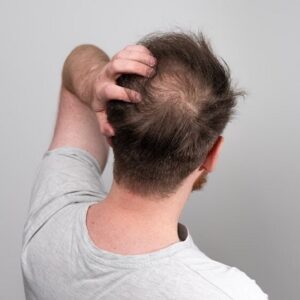
Hair loss in Islamabad is a problem to many people, who desire to maintain good looks and a good quality of life. If you are among the people who have alopecia problems it is crucial to find out if the medicines you used caused baldness.
In this blog, you will get to know the Medications that may cause hair loss. How you can avoid this while managing your health problems.
Types of Hair Loss Linked to Medications:
Telogen Effluvium:
This is the most frequent form of pharmacologic hair loss; while it affects 50% of people with this complication. As, the medication causes hair follicles to go into their rest cycle or the telogen phase, resulting in medication-induced hair shedding.
Anagen Effluvium:
Anagen effluvium is one of those hair losses where it occurs during the anagen phase of the hair cycle. Therefore, some medicines can cause more acute and dangerous types of alopecia. However, treatments like chemotherapy target fast-dividing cells, such as cancer cells.
Hair Loss-causing Drugs and Medicines:
Chemotherapy Drugs:
How It Affects Hair: Therefore, cancer cells are cells that divide rapidly to form tumors, a feature that makes them susceptible to chemotherapy. So, this results in anagen effluvium, a common condition in which hair falls off fast and in big numbers.
Examples: Some of the commonly known chemotherapy drugs, which are likely to affect hair growth are cyclophosphamide, doxorubicin, and methotrexate among others.
Blood Thinners (Anticoagulants):
How It Affects Hair: Hormones like warfarin used to thicken the blood may cause telogen effluvium due to interference with the hair growth cycle and cause shedding.
Examples: Some drugs that have been known to cause alopecia include heparin as well as warfarin.
Blood Pressure Medications:
How It Affects Hair: Therefore, drugs including beta blockers and other pharmaceuticals that affect blood pressure such as antagonists affect the hair growth cycle gently causing a slow process.
Examples: It was also discovered that atenolol, metoprolol, and propranolol produce hair loss as an adverse effect.
Hormonal pharmaceuticals :
How It Affects Hair: Contraceptive pills or other hormone therapies which change the hormones and androgen levels affect hair health.
Examples: Birth control pills, menopausal hormones (hormone replacement therapy), and testosterone boosters can cause hair loss in some people.
Acne Drugs(Retinoids):
How It Affects Hair: Some allergic reactions associated with pharmaceuticals used in the treatment of severe acne like retinoids are known to bring on baldness.
Examples: Accutane is another name for isotretinoin that is used in the treatment of acne; one of its side effects is hair loss.
If you have noticed that you are losing hair, the best course of action is to talk to your Surgeon about it before stopping. It is always dangerous to stop or change types of medication on your own without consulting your doctor.
How to manage Hair loss?
Discuss Alternatives with Your Doctor:
If hair loss remains a problem, discuss the other medications with the surgeon that may cause less alopecia. Often a change of the medication can clear hair loss without hampering the treatment in some instances.
Adjust the Dosage:
You can decrease the amount of some drugs used to alleviate baldness. Also, you should only do so under your doctor’s prescription to avoid harming your health further.
Maintain a Healthy Diet:
The sources of a healthy diet that are beneficial for hair include biotin, iron, and zinc. Certain nutrient deficiencies can cause or worsen alopecia by impairing proper diet.
Manage Stress:
This is especially true if you are suffering from another health condition as stress can make it even worse. So, Stress reduction such as having to take time off from work or doing yoga or exercises to improve your health and also hair health.
Gentle Hair Care:
Spare your hair from unkind styling treatments and reduce the heat on the hair, as this will make it easier to snap. See that you wash your hair with mild shampoos and conditioners; refrain from combing or pulling your hair.
Final Thoughts:
Medication-induced hair loss is a condition that may not be as serious and permanent as many people think. To solve the problem, it’s essential first of all to know which drugs cause hair thinning or shedding. When you take a certain drug, the hair loss requires proper treatment for hair care.So, If you are worried due to the hair loss caused by drugs then it’s not a big deal you can consult with our best surgeon Dr Husnain Khan in Islamabad by visiting Dynamic Clinic PK to get the solution for your hairloss.












